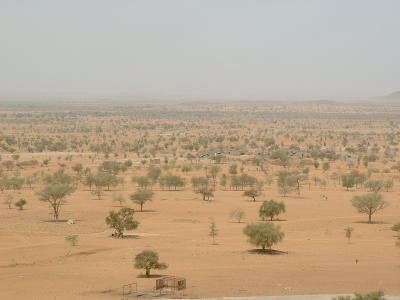
This is a brief account of my four-day bike trip up to the Sahara Desert back in March of '05.
At first I was reluctant to go on the trip because I didn' t feel like my bike was up to the strain. I own a Yamaha DT 125 dirt bike that's been adapted for the street (stuff like headlights, mirrors, etc.) and I'd never taken it out of the city before. So I was hesitant to test its limits.
The plan was to ride up to the northern part of Burkina Faso where the sand met the grassland and scrub of the sub-Saharan regions of West Africa. The photo above is pretty accurate.
Our trip started around noon on a Friday, right after school was out. There were going to be nine people on the trip: David, Zak, Josh, Emmanuel (Manny), Andrew, Mr. Ladish, Mr. Lyons, my dad, and me. Not everyone had a bike, and we had to carry provisions somehow, so Mr. Ladish volunteered the use of his truck for the extra passengers and the gallons of water we were taking.
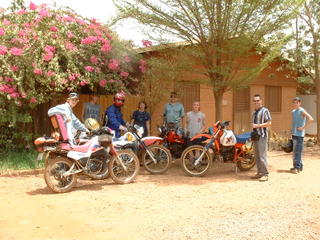
The trip out of Ouagadougou was, admittedly, the most dangerous part of the journey. After all, what's a few hundred miles of scorching sand compared to a herd of half-crazed taxi drivers? Once we got out of the city and onto the open road the only task was to try to stay out of each other's dust. The roads between cities in Burkina aren't guaranteed to be paved, and the North is in particularly bad repair; by the end of the trip my helmet was pockmarked with tiny craters from flying rocks kicked up by other bikers.
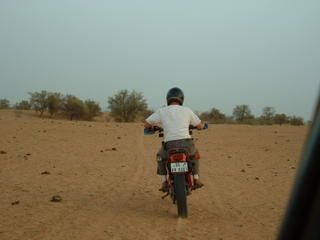
The first day was uneventful until we hit Djibo, a larger settlement about three hours' drive north of Ouagadougou. When you're on the bike you can't really communicate with anyone, so it wasn't until we'd stopped that I learned Emmanuel had heatstroke. He was throwing up and it hurt him to move, possibly because the bike he was riding had bad suspension and had been playing paddleball with his kidneys for several hours. We dropped him off with a missionary family and got the local doctor to have a look at him. We decided to continue on to our destination without him and to pick him up in the morning.
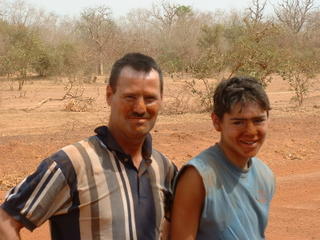 When we stopped we also noticed how dirty we were. I've already mentioned dust, but this was pretty serious. Zak and Mr. Lyons had it the worst.
When we stopped we also noticed how dirty we were. I've already mentioned dust, but this was pretty serious. Zak and Mr. Lyons had it the worst.
Because of our delay in Djibo, it was getting dark before we had reached Belehede, the village where we were going to stay for the night. It was then that David learned that his bike's headlights didn't work, and I learned that mine pointed about thirty degrees to the left of where it needed to be. The result was that all the bikers grouped together, sharing each other's light. Mr. Lyons led the way with his low beams on; David rode slightly behind him; I followed David on his left so that my headlight lit the road in front of him; and Josh rode beside me so I could see with his headlight. It was like a beautiful symbol of something symbolic.
We reached Belehede well after dark and tried to rinse some dirt off while the Ladishes arranged some dinner. They own a house in Belehede where they live while they work on a translation project. Their househelp made us a meal of pintad and rice with sauce, which was very welcome after a long day. Then we arranged our sleeping equipment (Zak and Josh slept on top of the truck) and basically died until dawn.
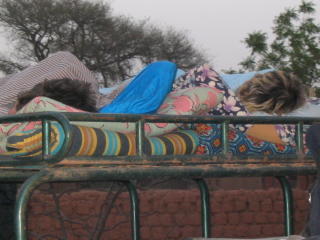
The next day we hit the flat areas of the world where the only plants that grow in the wild have thorns the size of pencils. This was also when we encountered the upside-down bridges. In Northern Burkina, someone realized that it was easier to just let the water go over the road when it rains (which is rarely) instead of having to bother with propping and shoring. Since the roads tend to be made by piling up dirt and bulldozing it flat on top, there is a certain amount of elevation on public highways. The upside-down bridges are just places where people have dug out part of the road and lined the hole with concrete so that cars can pass through the dip and water can pass over it. Josh and I had a lot of fun as we came out of the dips, often achieving more than a foot of air (which is hard on our bikes).
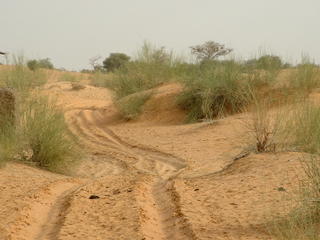 Eventually we left the beaten path and began winding our way around half-formed sand dunes along barely-discernable tire tracks. After a while we discovered that the bikes made better time where the sand was unbroken by vehicles, and we had a great time going fifty miles an hour over scrubland, dodging trees and rocks and bushes.
Eventually we left the beaten path and began winding our way around half-formed sand dunes along barely-discernable tire tracks. After a while we discovered that the bikes made better time where the sand was unbroken by vehicles, and we had a great time going fifty miles an hour over scrubland, dodging trees and rocks and bushes.
We stopped in a village for water from their well and then drove onward until we found a suitable camping spot. We build a fire and pitched the gazebo, and tried to wash as much of ourselves as we could with as little water as possible. Dinner was some sort of stew better eaten in the dark. It was at this campground that I started to be attacked by the "Scorpion-carrier" spiders, which are totally harmless and just as totally ugly. One of them was crawling up my shirt as I ate.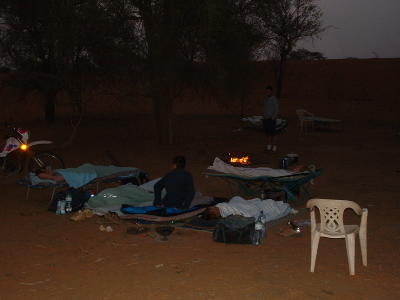
We were surprised by how cold the desert was at night. We'd all heard about it, I suppose, but it came as a shock to actually experience it firsthand. And then there was the Silence. It was worth the capital letter. I guess the quiet was caused by all those little desert creatures being too tired to move until things cooled down.
The next day we woke up before the sun had even crested our sand dune, and we all felt really rested despite the long ride of the previous day. I guess it was because we all went to bed as soon as it was dark, which was just after seven in the evening. In any case, some people were harder to wake than others, but we were all ready for another day.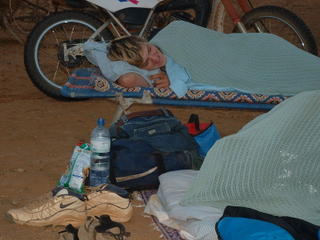
The third day was by far the most evenful. For one thing, we hit...the Dunes. We drove for a pretty short time in the morning until we came to a town called Oursi, where the scrubland lost its scrub and became the actual desert.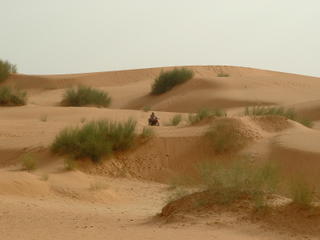
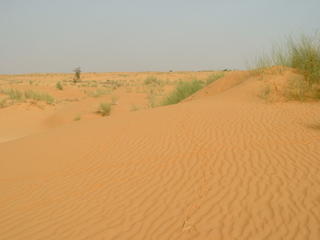
Of course, being the guys that we were, we stopped for a moment to take in the beauty and then proceeded to ride all over it. That was some seriously good riding, including a four-foot drop on my part due to a bit of misjudgment. My bike was fine, though.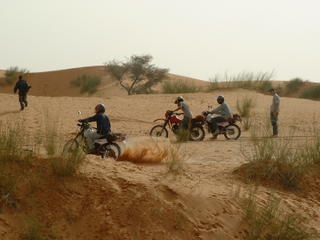
We cavorted around the dunes for about an hour, and then we had to go into Oursi to get gas and change a flat tire. It was the first of many problems to come.
While David and Manny were changing the tire, the rest of us went to find some shade where we could eat lunch. We found a likely tree in the middle of dry lakebed and started to eat when the Gendarmes on patrol approached us and asked us to make ourselves scarce. Apparently a dignitary who had contributed largely to the construction of the road was coming through town to see what his funds were doing, and we were a little too scruffy and out-of-place for the Gendarms' taste.
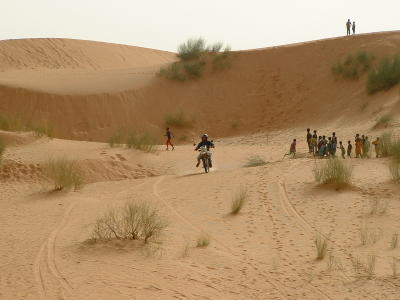 In any case, we were asked to quietly move to somewhere out of sight. We did so grudgingly, but we had to get word to Manny and David, who were still in town trying to fix the tire. I volunteered to go, but as I got onto the road, I realized that the dignitary had arrived and was being escorted into town. I ended up sort of leading the procession. It was made more awkward by the fact that my muffler had fallen off shortly before, making my bike twice as loud as it usually was. I'm proud to say that a loose muffler was the only technical problem I had with my bike on the whole trip.
In any case, we were asked to quietly move to somewhere out of sight. We did so grudgingly, but we had to get word to Manny and David, who were still in town trying to fix the tire. I volunteered to go, but as I got onto the road, I realized that the dignitary had arrived and was being escorted into town. I ended up sort of leading the procession. It was made more awkward by the fact that my muffler had fallen off shortly before, making my bike twice as loud as it usually was. I'm proud to say that a loose muffler was the only technical problem I had with my bike on the whole trip.
We had to wait until about three o'clock in the afternoon before we could continue our trip, so we burned time by reading, eating, sleeping, and/or fixing various bike problems. I got out my air rifle and tried to do some shooting, but everyone decided it was more prudent to leave the gun out of sight since it had a scope and there was an important person in town and the Gendarms were moving up and down the road and there can be hasty conclusions drawn from the sight of a guy carrying a gun with a scope on it.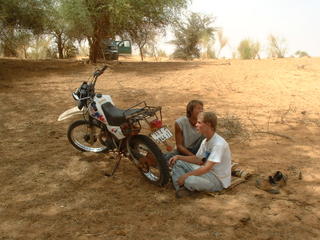
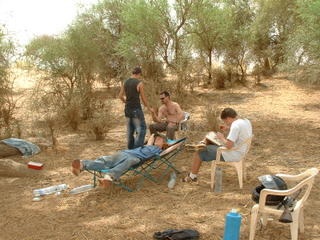
We eventually managed to get out of town and continue north on our trip that would nearly brush the Malian border. We encountered several more problems, mostly along the lines of flat tires because of the malignant landscape. At one point the truck got a flat while David was driving it and no one could seem to find a tire iron. By the time we found out that David was delayed the rest of us had pitched camp, so I ended up making runs back and forth to the truck with information and--more importantly--water.
That night we slept very well and woke up on Easter Sunday to another flat tire. It had lost air during the night, which made two repair jobs to finish before we left because Josh had never finished fixing his bike. We finally got all the tires to hold air, at least temporarily; we lined up for a group picture and left.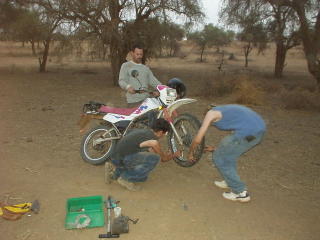
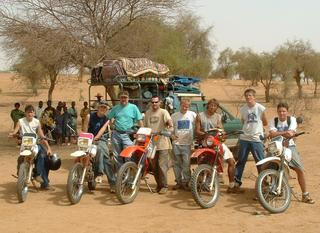
If anyone's seen "Hidalgo," then you'll know what kind of landscape we ended up riding over for a while. It was incredibly flat, incredibly hot, and covered with shrapnel-like chunks of rock.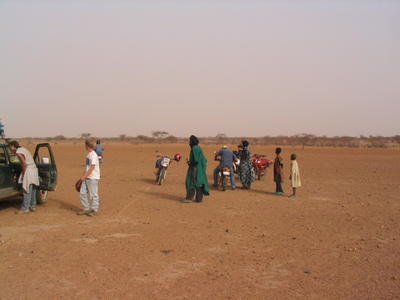
Of course the unwritten laws of the Universe demanded that David's tire go flat again in an area with no cover. We got tired of trying to patch the innertube so we just threw it in the back of the truck and kept going. We made it back to Belehede by nightfall and enjoyed our first shower in days.
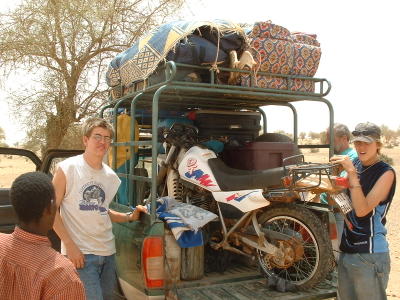
We arrived back in Ouagadougou around six in the evening of the next day, and of course we flocked to the Coke fridge before we even took off our helmets. It's just one of those things; we'd been drinking perfectly good water for days, but Coke is one of those things.
I had a lot of fun on the trip, which I hadn't originally expected. Still, it was nice to sleep in the air-conditioning after days in the baking heat. I leave you with a panorama of desert beauty.




















